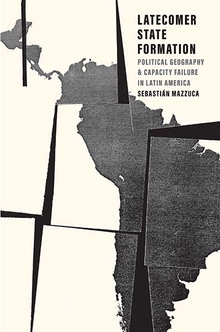Latecomer State Formation
WARNING
You are viewing an older version of the Yalebooks website. Please visit out new website with more updated information and a better user experience: https://www.yalebooks.com
Political Geography and Capacity Failure in Latin America
Sebastian Mazzuca
A major contribution to the field of comparative state formation and the scholarship on long-term political development of Latin America
“Ambitious and rich. . . . A sweeping and general theory of state formation and detailed historical reconstruction of essential events in Latin American political development. It combines structural elements with a novel emphasis on the political incentives and bargaining that shaped the map we have today.”—Hillel David Soifer, Governance
Latin American governments systematically fail to provide the key public goods for their societies to prosper. Sebastián Mazzuca argues that the secret of Latin America’s failure is that its states were “born weak,” in contrast to states in western Europe, North America, and Japan. State formation in post-Independence Latin America occurred in a period when capitalism, rather than war, was the key driver forging countries. In pursuing the short-term benefits of international trade, Latin American leaders created states with chronic weaknesses, notably patrimonial administrations and dysfunctional regional combinations. Mazzuca analyzes pathways leading to variations in country size and level of pacification: “port-led” state formation in Argentina and Brazil; “party-led” in Mexico, Colombia, and Uruguay; and “lord-led” in Central America, Venezuela, and Peru.
Sebastián Mazzuca is assistant professor of political science at Johns Hopkins University. His research and teaching focus on the political economy of development, democratization, and state formation.
“In this dazzling and conceptually innovative book, Mazzuca distills the core logic of state formation in Latin America. Latecomer State Formation illuminates how global historical forces shape the very size and capacity of modern states. Magisterial and incisive, it is indispensable reading for any comparative scholar of state-building in the post-colonial world.”—Maya Tudor, University of Oxford
Publication Date: May 11, 2021
13 b/w illus.








